Iran Tells Gulf Arab States To Stop "Repetitive Accusations'
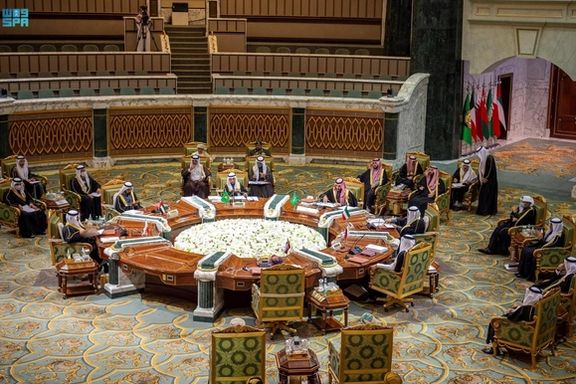
Iran has called on Gulf countries Wednesday to avoid repetitive accusations, a day after a Gulf Arab summit accused Tehran of stalling regional talks.

Iran has called on Gulf countries Wednesday to avoid repetitive accusations, a day after a Gulf Arab summit accused Tehran of stalling regional talks.
"We call on the few countries who express unconstructive views in the name of the Gulf Cooperation Council to reconsider their approach to regional issues by replacing repeated accusations with cooperation," Foreign Ministry Spokesman Saeed Khatibzadeh said.
The Gulf Arab summit held on Tuesday in Saudi Arabia urged Iran to take concrete steps to ease regional tensions while reiterating a call to include the region in talks between global powers and Tehran aimed at salvaging a 2015 nuclear agreement.
Saudi Crown Prince Mohammed bin Salman speaking at the summit said Iran’s nuclear and missile programs should be handled "seriously and effectively."
"We had believed that there would be a new attitude from the (GCC) after recent diplomatic actions between Iran and Gulf Arab states," Khatibzadeh said, adding: "Iran will not accept any interference in its defense capabilities, missile and peaceful nuclear programs."
Saudi Arabia's crown prince told the summit that the nuclear and missile programs of Iran, Riyadh's longstanding regional adversary, should be handled "seriously and effectively".
With reporting by Reuters
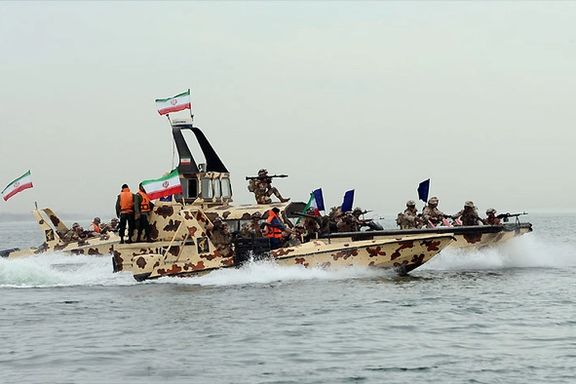
The US Navy announced Wednesday it tested a laser weapon and destroyed a floating target in the Mideast.
The system that could be used to counter bomb-laden drone boats deployed by Yemen's Houthi rebels in the Red Sea. Another ever-present threat is armed speed boats deployed by Iran’s Revolutionary Guard that have often menaced US Navy vessels.
The test Tuesday saw the USS Portland test-fire its Laser Weapon System Demonstrator at the target in the Gulf of Aden.
The Navy's Mideast-based 5th Fleet described the laser as having "successfully engaged" the target in a statement.
Previously, the Portland used the laser to bring down a flying drone in May 2020.
The Houthis have deployed drone boats into these waters, which can be piloted remotely and sent up to a target before detonating.
These boats are suspected of being built with Iran's help.
Emirati officials in 2018 showed off footage they described as coming from a drone boat computer that had Iranians building components for the boat's guidance system, with a hat visible in the background of one picture bearing the symbol of Iran's hardline Revolutionary Guard.
Iran has denied arming the Houthis, though United Nations experts, independent analysts and Western nations point to evidence showing Tehran's link to the weapons.
Report by AP
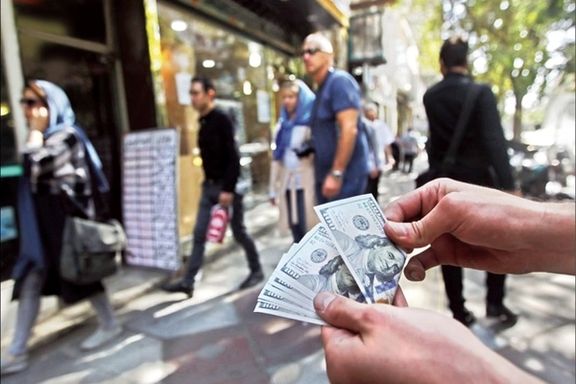
Police in Iran has once again resorted to arrests and intimidation to control the fall of the national currency, the rial in the local exchange market.
Police officials on Wednesday announced the arrests of 42 money exchangers and closure of 20 currency exchange outlets in Tehran accusing them of manipulating the market. The police also summoned managers of 20 websites and social media apps and warned them about exchange rates.
The rial has fallen to more then 300,000 against the US dollar, as negotiations over Iran’s nuclear program in Vienna are stalled and the economic outlook for the country seems bleak. The rial has fallen nearly tenfold since the end of 2017, when it became likely that the United States would abandon the 2015 nuclear agreement and impose sanctions.
Iran’s police and courts have arrested and prosecuted tens of people since 2018 on charges of boosting the value of the dollar or the price of gold, while the fall of the rial is the result of Iran’s economic crisis.
Last week also the Intelligence Ministry arrested five people and closed 841 bank accounts it said were involved in “illegal” currency and futures trade.
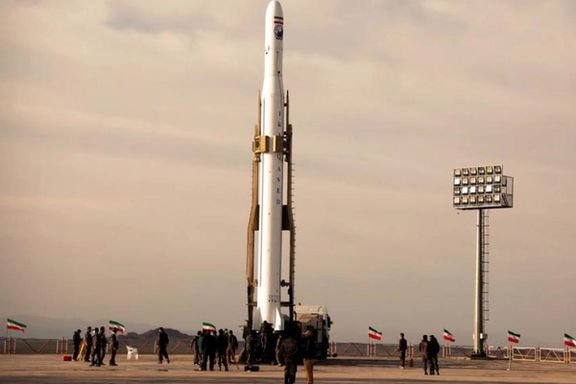
Iran's hardline President Ebrahim Raisi has allocated 12 times more money to the country's space program in his new budget amid nuclear talks with world powers.
The budget bill for the next Iranian year, which starts on March 21, includes eight trillion rials for the Revolutionary Guard's Aerospace Command, as well as additional budgets to other organizations that contribute to the program.
The 8-trillion rial funding is a modest $35 million if calculated at current business exchange rates, but it is a large sum when most of it is spent in Iran, where salaries and equipment is much cheaper.
This is in contrast to last year's budget in which Rouhani had allocated only 390 billion rials to the Space Organization affiliated with the Ministry of Communication and 280 million rials to the ministry itself to spend on expanding infrastructure. This clearly shows the two government's approaches to boosting the space program.
So far there is no news of the imminent satellite launch foreign media and space monitoring agencies have been talking about during recent days. However, members of the Higher Council for Aerospace Activities have met recently after 11 years, and activities monitored around Iran's launching pads in Semnan area in central Iran indicate that a launch will probably take place.
President Raisi has said that the meeting is indicative of the high priority his government attaches to the space program. Others attending the meeting included General Amir Hajizadeh the commander of the IRGC's Aerospace Force and Foreign Minister Hossein Amirabdollahian.
During the past decade Iran has launched several satellites into space but their journeys in the outer space did not last long. In 2003, one of the Iranian satellites even carried an ape but no one believed the animal Iran showed as the one returning to earth was the same monkey.
Observers outside Iran have charged that Iran's space program is a cover to justify its testing of ballistic missiles. Israel and the United States have said that Iran's space program is against a UN decision saying Iranian missiles should not have nuclear weapons capability.
The activities monitored in the central Iranian desert are similar to preparations made ahead of missile and satellite launches coinciding with nuclear negotiations. There were criticisms in the past that such moves were meant to sabotage any rapprochement between Iran and the West.
After the 2015 nuclear deal, the IRGC launched missiles with Hebrew slogans written on them calling for wiping Israel off the map. The difference this time is that those who are negotiating and those who launch the missiles are not each other's political rivals. They both come from the heart of Iran's hardliner conservative camp.
While monitoring agencies and foreign entities are closely following the moves on the ground, Iran has not been concealing its ambitions in space. Raisi visited a space technology exhibition in Tehran on November 26 and asked officials to work on reaching the 36,000 km orbit around the earth in four years.
The likely blast off at Iran's Imam Khomeini Spaceport comes as Iranian state media has offered a list of upcoming planned satellite launches in the works for the Islamic Republic's civilian space program, which has been beset by a series of failed launches.
While missile and satellite launches in the previous years might had been aimed at disrupting negotiations over Iran's nuclear program, this time it appears that Iranian officials are mainly about to show off Tehran's technological progress and highlight the country's ballistic missile capabilities possibly to scare regional players.
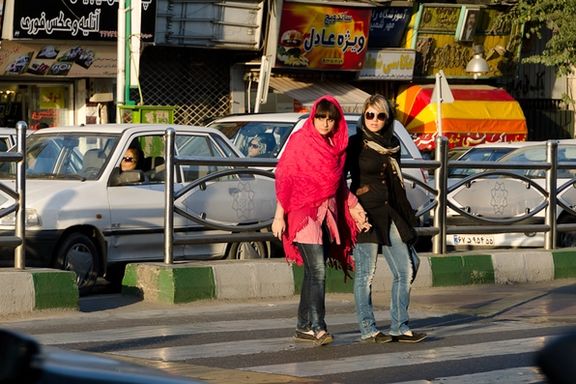
A lawmaker and cleric has apologized for saying that people who consider musical instruments and sunglasses priorities should leave Iran and reside elsewhere.
After strong reaction to an interview in Didban-e Iran website Friday, Kazem Mousavi said Tuesday his remarks had been distorted and that scarce foreign currency was needed for importing food and other badly-needed goods.
But in the earlier interview Mousavi had not just defended the import bans for economic reasons. The hardline cleric had also said that musical instruments should not be allowed in an Islamic country. It is not clear at all what was the religious source for making such a claim about sunglasses, as many Islamic Republic officials have been seen outdoors wearing sunglasses.
The problem of clerics making up rules as they go along is a source of tensions in Iran. The Quran is often very general on issues of lifestyle, but clerics, especially of the hardline variety, make their own interpretations which they impose on society using their political power in the government.
Mousavi noted that anyone who desired a different lifestyle should leave Iran. The parliament member was criticized on air by Mohamad Delavari, a popular and outspoken presenter on state television (IRIB). "Who has given you the right to make decisions for the people?” Delavari opined. “You have one vote to cast in the parliament. Cast your own vote and leave us to ourselves. You are in no position to decide what is in the country's interest.”
Many others in articles and social media highlighted Mousavi and his associates' interest in music and sunglasses at a time when the country grappled with much bigger problems. Social media users posted hundreds of selfies with sunglasses, holding musical instruments, or both with the hashtag "We are here and not going anywhere."
Such criticism is very rare in the highly-controlled IRIB where everyone is ideologically and politically screened for employment.
Others reminded Mousavi of the few votes he won in parliamentary elections of February 2020, when he was elected on a low turnout after the Guardian Council, the constitutional watchdog, barred several rivals.
"Do you want anyone whose back is breaking under the pressure of inflation to leave Iran too?" asked a commentary in the Asr-e Iran website Monday. "Anyone who was born inside Iran’s borders and has an Iranian birth certificate is an Iranian … Why does Mr Mousavi think he has a higher right than us?”
Despite the view of some religious fundamentalists, Iranian music continues to flourish and young people follow Western pop music.
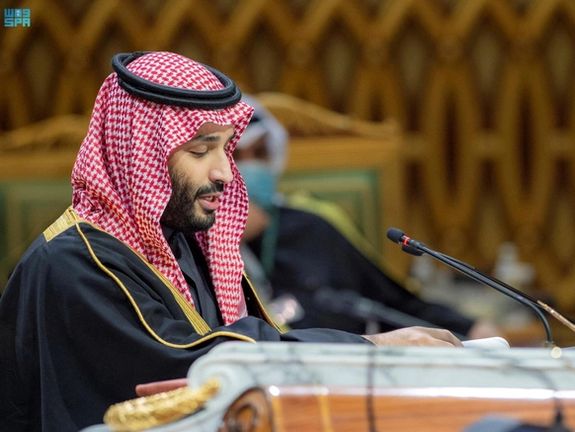
Saudi Arabia has told a Gulf Arab summit on Tuesday Iran’s nuclear and missile programs should be handled "seriously and effectively" amid nuclear talks with Tehran.
Saudi Crown Prince Mohammed bin Salman, speaking before a closed session of the Gulf Cooperation Council (GCC) summit, also said Riyadh, which has launched its own direct talks with Iran, supported resolving conflict through dialogue.
After a few rounds of talks earlier this year, there have been no new meetings between Riyadh and Tehran. Saudi officials have said that talks so far have been exploratory. Riyadh's UN envoy Abdallah Al-Mouallimi told Saudi newspaper Arab News in a video interview published on Monday that no major results had been achieved. He said Tehran was so far biding its time and playing "games" in the discussions.
Closing remarks read by GCC Secretary General Nayef al-Hajraf stressed the importance of joint efforts by Gulf states to face threats and to avoid regional and international conflicts.
"Member states of the (GCC) consider that any attack on any of them is an attack on them all, and any danger that threatens one of them is threatening them all," he said.
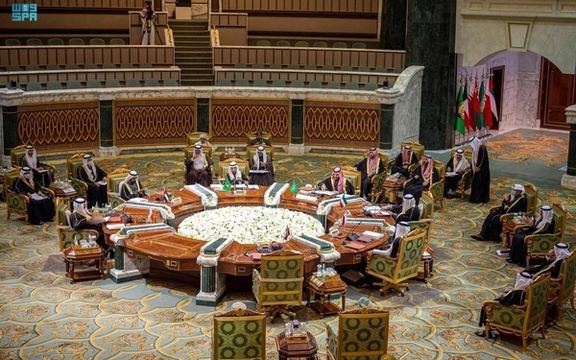
Saudi Arabia and non-Gulf Egypt have restored diplomatic ties with Qatar but the United Arab Emirates and Bahrain have yet to do so, though Abu Dhabi has moved to mend fences.
"There are areas that will need some time, but... practical, functional (Gulf) cooperation is back on track," senior UAE official Anwar Gargash said last week.
Prince Mohammed had visited Gulf states ahead of the summit in a tour aimed at highlighting solidarity as global powers seek to revive a nuclear pact with Iran, amid deepening Gulf uncertainty about the US role in the region.
Riyadh and Abu Dhabi, concerned about Iran's nuclear ambitions, missile program and regional proxies, are engaging with Tehran to contain tension.
Iran's new, hardline president has said his foreign policy priority would be improving ties with Gulf neighbors.
But nuclear talks in Vienna aimed at restoring the 2015 nuclear agreement between Iran and world powers face uncertainty, while Iran is enriching more uranium and getting closer to a nuclear breakout point.
Hajraf told Saudi TV ahead of the summit that Iran should "offer indications of good intent".
Saudi Arabia and the UAE have moved away from hawkish foreign policies that saw them wade into Yemen and lead the boycott of Qatar, to a more conciliatory approach as they vie to lure foreign investment and win over US President Joe Biden.
Abu Dhabi has moved faster to improve ties with Iran and Turkey while also re-engaging with Syria after forging relations with Israel last year.
Reporting by Reuters